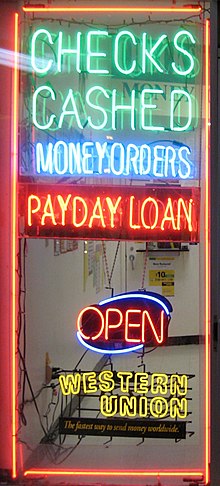
A payday loan (also called a payday advance, salary loan, payroll loan, small dollar loan, short term, or cash advance loan) is a small, short-term unsecured loan, "regardless of whether repayment of loans is linked to a borrower's payday."[1][2][3] The loans are also sometimes referred to as "cash advances," though that term can also refer to cash provided against a prearranged line of credit such as a credit card. Payday advance loans rely on the consumer having previous payroll and employment records. Legislation regarding payday loans varies widely between different countries and, within the United States, between different states.[4]
To prevent usury (unreasonable and excessive rates of interest), some jurisdictions limit the annual percentage rate (APR) that any lender, including payday lenders, can charge. Some jurisdictions outlaw payday lending entirely, and some have very few restrictions on payday lenders. In the United States, the rates of these loans were formerly restricted in most states by the Uniform Small Loan Laws (USLL),[5][6] with 360%–400% APR generally the norm.[7]
- ^ Insley, Jill (July 12, 2012). "GE Money refuses mortgages to payday loan borrowers". The Guardian. London.
- ^ Michelle Hodson ,fdic.gov, November 18, 2009, How Payday Loans Work Archived May 1, 2017, at the Wayback Machine
- ^ "Money Talks". Ebony. Johnson Publishing Company: 43. September 2005.
- ^ Kendzior, Sarah (May 9, 2015). "The US payday loans crisis: borrow $100 to make ends meet, owe 36 times that sum". theguardian. Retrieved October 23, 2015.
- ^ Mayer, Robert (2012). "Loan Sharks, Interest-Rate Caps, and Deregulation". Retrieved August 27, 2014.
- ^ Carruthers, Bruce (2007). "The Passage of the Uniform Small Loan Law" (PDF). Archived from the original (PDF) on September 23, 2015. Retrieved August 27, 2014.
- ^ "What is a payday loan?". Consumer Financial Protection Bureau. January 17, 2022. Retrieved May 11, 2022.
